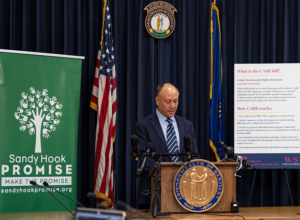Our guest blogger is Rachel Masi, Ph.D., Research Director at Sandy Hook Promise & Licensed Clinical Psychologist, and a Trusted Adult.
Trusted adults are crucial to the emotional stability, social health, and development of children and adolescents. They are parents, guardians, teachers, faith leaders, grandparents, neighbors, babysitters, coaches, therapists, and more.
Schools are the main environments where young people engage in continuous and evolving interactions with peers, teachers, and the community. These interactions are the bedrock of a social context, which promotes growth and change daily.
As a trusted adult, you can help the students in your life create and sustain relationships with peers and other trusted adults to ease the transition into the school year. Use these Cornerstone C’s as a checklist for a reminder on what you can do to help.
Connect
- Make socialization and interpersonal relationships a priority, rather than solely focusing on books and academics.
- Encourage connections with peers and other trusted adults at school.
- Plan and recommend play activities or group projects so peers can connect to share some conversation and laughs.
Calm
- Practice self-care.
- You need to be emotionally regulated, therefore able to provide emotional support for youth in need.
Creative
- Find ways to engage children and teens in creative outlets. Activities like art, music, cooking, and building things can provide learning opportunities, while also offering an outlet to decompress and strengthen additional skills.
- Get creative about new sports and hobbies. If team sports aren’t available, select something new to try that is physical. Learn to dribble a soccer ball, grab a yo-yo and try some tricks, set up an indoor or outdoor golf putting green, try skateboarding, or practice yoga.
Choices
- Choices help children and adolescents feel empowered, thus providing a sense of control within a world that may feel out of their control.
- Simple choices can have the greatest impact so it is crucial to ensure opportunities for choice. Educators can offer choices for discussion topics, brain breaks, and group projects. Parents and caregivers can give children an open-door policy to be silly! For example, when it’s time to go to bed, they can walk, roll, or hop like a frog to the bed.
- Ask children, “Would you like to do your math or your writing first?” “Do you want to email the teacher the question or ask a friend?” “Which friend do you want to play a virtual game with?”
Compassion
- Trusted adults can model compassionate, empathetic, and pro-social behaviors.
- While you may not be able to help with everything, you can listen, show compassion, and provide validation.
- Have self-compassion:
- This is hard, and you can’t do it all.
- Prioritize your own work and obligations, and self-care as a trusted adult.
- Model to older children how to break up school projects into smaller, more manageable tasks.
- Remember that emotional well-being is just as important as academic success.
Are you an educator or school staff member? Learn about supplemental trainings for Trusted Adults, part of our Say Something program, and access no-cost resources at our Learning Center.


